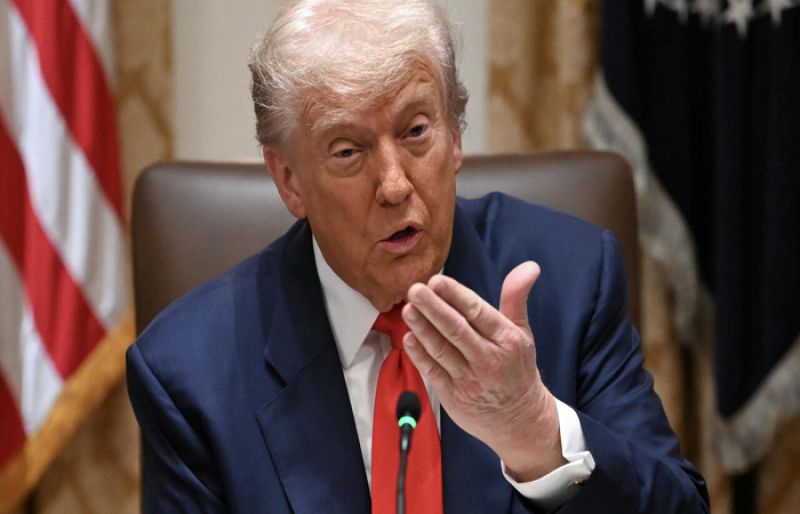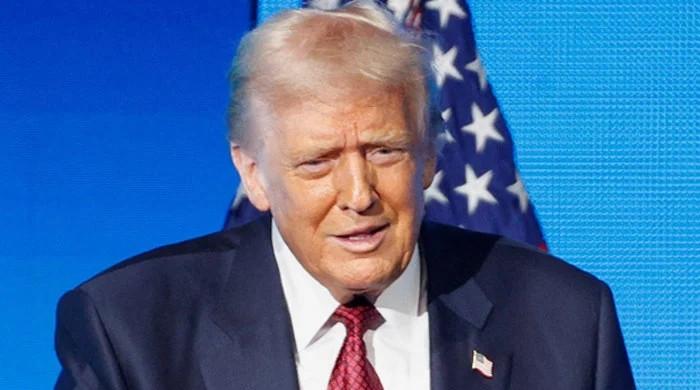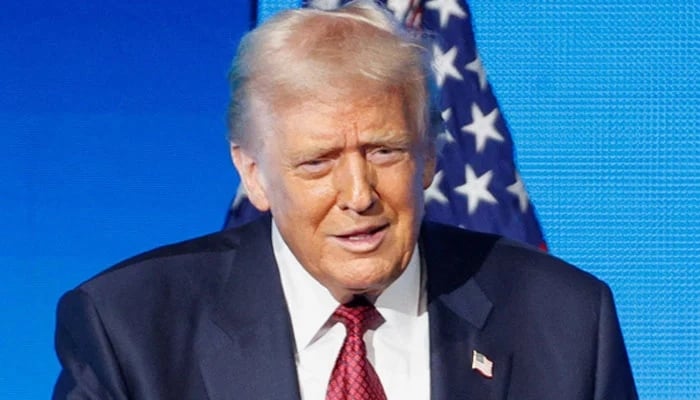Politics
Trump warns of halting cooking oil imports from China


U.S. President Donald Trump has lashed out at China for suspending American soybean imports, calling the move an “economically hostile act” and warning that Washington could retaliate by halting purchases of cooking oil from the world’s second-largest economy.
“We are considering terminating business with China related to cooking oil and other areas of trade as retribution,” Trump wrote on his Truth Social platform on Tuesday.
His online remarks came shortly after a more measured statement to reporters at the White House, where he suggested that ties between Washington and Beijing remained manageable.
“We have a fair relationship with China, and I think it’ll be fine. And if it’s not, that’s okay too,” Trump said.
Trade frictions between the two economic giants have flared once again during Trump’s second presidency, with both sides imposing heavy tariffs at various points.
In a recent interview with the Financial Times, U.S. Treasury Secretary Scott Bessent accused Beijing of undermining the global economy through sweeping new export restrictions on rare earth materials a key sector in global technology manufacturing.
Trump, meanwhile, said the U.S. must “be careful with China.”
“I have a great relationship with President Xi (Jinping), but sometimes it gets testy because China likes to take advantage of people,” he said. “When the punches are thrown, you have to put up the blocks.”
On Truth Social, Trump added that China’s halt of soybean imports was already hurting American farmers.
According to U.S. government data, imports of animal fats, greases, and processed oils including used cooking oil have surged in recent years, largely driven by the nation’s growing production of biomass-based diesel.
China tariff threat
While tensions between Washington and Beijing have de-escalated from their peak, the truce remains shaky.
After Beijing imposed fresh controls on the export of rare earth technologies and items, Trump said he would roll out an additional 100-percent tariff on the country’s goods from November 1.
And US Trade Representative Jamieson Greer told CNBC separately that this timeline could be accelerated.
“A lot depends on what the Chinese do,” Greer said in the interview, adding that Beijing had “chosen to make this major escalation.”
China is the world’s leading producer of the minerals used to make magnets crucial to the auto, electronic and defense industries.
Bessent told the Financial Times: “This is a sign of how weak their economy is, and they want to pull everybody else down with them.”
Last week, Trump also threatened to scrap a planned meeting with Xi at the Asia-Pacific Economic Cooperation (APEC) summit starting later this month.
China over the weekend accused the United States of “double standards” after Trump’s threat of further tariffs.
On Tuesday, China said it was ready to “fight to the end” in a trade war with the United States.
China says ‘no winners’ in trade war
China said on Wednesday that trade wars had “no winners”, after US President Donald Trump warned that the United States could stop buying cooking oil from the country.
Trump issued the threat Tuesday after slamming Beijing’s halt of US soybean purchases as an “economically hostile act”.
“We are considering terminating business with China having to do with Cooking Oil, and other elements of Trade, as retribution,” Trump said on his Truth Social platform.
While tensions between Washington and Beijing have eased from their peak earlier in the year, a truce struck by the leaders remains shaky.
Beijing imposed fresh controls on the export of rare earth technologies and other items last week, leading Trump to warn Friday that he would roll out an additional 100 percent tariff on the country’s goods from November 1.
China’s foreign ministry on Wednesday said trade disputes were “not in the interests of any party” when asked about Trump’s threat on cooking oil, which is used for biofuels including biodiesel and sustainable aviation fuel.
“The two sides should resolve relevant issues through consultation on the basis of equality, respect and mutual benefit,” spokesman Lin Jian told reporters at a regular briefing.
“China’s position on China-US economic and trade issues is consistent and clear,” he added.
The United States was the biggest purchaser of Chinese used cooking oil last year, buying 1.27 million tonnes, a rise of more than 50 percent from 2023.
That accounted for more than 40 percent of Chinese exports of the product, according to the US Department of Agriculture.
Beijing on Wednesday also defended its latest export controls on rare earths as protecting global security, after the European Union’s trade chief Maros Sefcovic said the restrictions were unjustified and called for a response.
China is the world’s leading producer of the minerals used to make magnets crucial to the auto, electronics and defence industries.
Chinese leaders had “made clear their position” on its latest policies, spokesman Lin said.
Controls were implemented “to better safeguard world peace and regional stability and fulfill international obligations such as non-proliferation”, he added.
Politics
Race to get aid to Asia flood survivors as toll nears 1,200


- Sri Lanka declares emergency and seeks global aid.
- Over 631 dead, 472 missing across Sumatra, Indonesia.
- Survivors describe sudden, tsunami-like flood waves.
Governments and aid groups in Indonesia and Sri Lanka worked to rush aid Tuesday to hundreds of thousands stranded by deadly flooding that has killed around 1,200 people in four countries.
Torrential monsoon season deluges paired with two separate tropical cyclones last week dumped heavy rain across all of Sri Lanka and parts of Indonesia’s Sumatra, southern Thailand, and northern Malaysia.
Climate change is producing more intense rain events because a warmer atmosphere holds more moisture, and warmer oceans can turbocharge storms.
The floodwaters have now largely receded, but the devastation means hundreds of thousands of people are now living in shelters and struggling to secure clean water and food.
In Indonesia’s Aceh, one of the worst-affected regions, residents told AFP that survivors who could afford to were stockpiling supplies.
“Road access is mostly cut off in flood-affected areas,” 29-year-old Erna Mardhiah said as she joined a long queue at a petrol station in Banda Aceh.
“People are worried about running out of fuel,” she added from the line she had been in for two hours.
The pressure has caused skyrocketing prices.
“Most things are already sky-high… chillies alone are up to 300,000 rupiah per kilo ($18), so that’s probably why people are panic-buying,” she said.
On Monday, Indonesia’s government said it was sending 34,000 tons of rice and 6.8 million litres of cooking oil to the three worst-affected provinces, Aceh, North Sumatra and West Sumatra.
“There can be no delays,” Agriculture Minister Andi Amran Sulaiman said.
Food shortage risk
Aid groups said they were working to ship supplies to affected areas, warning that local markets were running out of essential supplies and prices had tripled already.
“Communities across Aceh are at severe risk of food shortages and hunger if supply lines are not reestablished in the next seven days,” charity group Islamic Relief said.
A shipment of 12 tonnes of food from the group aboard an Indonesian navy vessel was due to arrive in Aceh on Tuesday.
At least 631 people were killed in the floods across Sumatra, and 472 are still listed as missing. A million people have evacuated from their homes, according to the disaster agency.
Survivors have described terrifying waves of water that arrived without warning.
In East Aceh, Zamzami said the floodwaters had been “unstoppable, like a tsunami wave.”
“We can’t explain how big the water seemed. It was truly extraordinary,” said the 33-year-old, who, like many Indonesians, goes by one name.
People in his village sheltered atop a local two-storey fish market to escape the deluge and were now trying to clean the mud and debris left behind while battling power and telecommunications outages.
“It’s difficult for us (to get) clean water,” he told AFP on Monday.
“There are children who are starting to get fevers, and there’s no medicine.”
The weather system that inundated Indonesia also brought heavy rain to southern Thailand, where at least 176 people were killed.
Across the border in Malaysia, two more people were killed.
Colombo floodwaters recede
A separate storm brought heavy rains across all of Sri Lanka, triggering flash floods and deadly landslides that killed at least 390 people.
Another 352 remain missing, and some of the worst-hit areas in the country’s centre are still difficult to reach.
President Anura Kumara Dissanayake has declared a state of emergency to deal with what he called the “most challenging natural disaster in our history”.
Unlike his Indonesian counterpart, he has called for international aid.
Sri Lanka’s air force, backed by counterparts from India and Pakistan, has been evacuating stranded residents and delivering food and other supplies.
In the mountainous Welimada region, security forces on Monday recovered the bodies of 11 residents buried by mudslides, a local official said.
In the capital Colombo meanwhile, floodwaters were slowly subsiding on Tuesday.
The speed with which waters rose around the city surprised local residents used to seasonal flooding.
“Every year we experience minor floods, but this is something else,” delivery driver Dinusha Sanjaya told AFP.
“It is not just the amount of water, but how quickly everything went under.”
Rains have eased across the country, but landslide alerts remain in force across most of the hardest-hit central region, officials said.
Politics
White House says Trump MRI was preventative, president in excellent health


WASHINGTON: The White House has said that President Donald Trump is in good health, even as people continue to question how his age may affect his performance as the country’s most powerful man.
White House press secretary Karoline Leavitt said on Monday that a recent MRI conducted on President Trump was preventative in nature and revealed that he was in good cardiovascular health.
Speaking to reporters at a press briefing at the White House, Leavitt said men of Trump’s age benefited from such screenings.
‘President Trump’s cardiovascular imaging was perfectly normal, no evidence of arterial narrowing, impairing blood flow or abnormalities in the heart or major vessels,’ Leavitt said of the 79-year-old president.
‘The heart chambers are normal in size. The vessel walls appear smooth and healthy, and there are no signs of inflammation or clotting. Overall, his cardiovascular system shows excellent health. His abdominal imaging is also perfectly normal,’ Leavitt said.
Trump underwent a magnetic resonance imaging scan during a recent medical evaluation, but did not disclose the purpose of the procedure, which is not typical for standard check-ups. The lack of details raised questions about whether full information regarding the president’s health is being released in a timely fashion by the White House.
Trump is sensitive about his age and well-being. He personally attacked a female New York Times reporter on social media last week over a story she co-wrote examining the ways that Trump’s age may be affecting his energy levels.
Politics
Tajikistan says five Chinese nationals killed in cross-border attacks from Afghanistan in past week


Five Chinese nationals have been killed and five more injured in Tajikistan in attacks launched from neighbouring Afghanistan over the past week, Tajik authorities and China’s embassy in the Central Asian country said on Monday.
China’s embassy in Dushanbe, the capital, advised Chinese companies and personnel to urgently evacuate the border area.
It said that Chinese citizens had been targeted in an armed attack close to the Afghan border on Sunday. On Friday, it said that another border attack — which Tajik authorities said had involved drones dropping grenades — had killed three Chinese citizens.
Tajikistan, a mountainous former Soviet republic of around 11 million people with a secular government, has tense relations with the Taliban authorities in Afghanistan. It has previously warned of drug smugglers and illicit gold miners working along the remote frontier.
China, which also has a remote, mountainous border with Tajikistan, is a major investor in the country.
There was no immediate response on Monday from the authorities in Afghanistan to the Tajik statement.
But Afghanistan’s foreign ministry last week blamed an unnamed group, which it said was out to create instability, and said it would cooperate with Tajik authorities.
Tajik President Emomali Rahmon’s press service said on Monday that Rahmon had met with the heads of his security agencies to discuss how to strengthen border security.
It said that Rahmon “strongly condemned the illegal and provocative actions of Afghan citizens and ordered that effective measures be taken to resolve the problem and prevent a recurrence of such incidents.”
Tajikistan endured a brutal civil war in the 1990s after independence from Moscow, during which Rahmon initially rose to power. The country is closely aligned with Russia, which maintains a military base there.
Millions of Tajiks, a Persian-speaking nation, live across the border in Afghanistan, with Tajikistan historically having backed Afghan Tajiks opposed to the Taliban.
-

 Sports1 week ago
Sports1 week agoWATCH: Ronaldo scores spectacular bicycle kick
-

 Entertainment1 week ago
Entertainment1 week agoWelcome to Derry’ episode 5 delivers shocking twist
-

 Politics1 week ago
Politics1 week agoWashington and Kyiv Stress Any Peace Deal Must Fully Respect Ukraine’s Sovereignty
-

 Business1 week ago
Business1 week agoKey economic data and trends that will shape Rachel Reeves’ Budget
-

 Politics1 week ago
Politics1 week ago53,000 Sikhs vote in Ottawa Khalistan Referendum amid Carney-Modi trade talks scrutiny
-

 Tech7 days ago
Tech7 days agoWake Up—the Best Black Friday Mattress Sales Are Here
-

 Entertainment1 day ago
Entertainment1 day agoSadie Sink talks about the future of Max in ‘Stranger Things’
-

 Tech2 days ago
Tech2 days agoGet Your Steps In From Your Home Office With This Walking Pad—On Sale This Week






